There’s nothing better than dispelling false narratives, which is probably why I had so much fun researching this one and diving deep into the numbers.
What’s the false narrative I’m talking about? It’s the idea that Aaron Rodgers has not been a good playoff quarterback.
Your favorite sports talk radio hosts have probably said something like this at one point or another. The top NFL experts on TV have pushed this narrative as well. The Twitter mob has seemingly been yelling it from the rooftops.
This idea that Rodgers hasn’t been a good playoff quarterback isn’t even presented as a question or debate anymore. It’s been circulating for a few years and is now just accepted as fact.
And it isn’t even close to being accurate.
We know where this narrative is coming from. Rodgers’ 11-10 W-L record as a starter in the playoffs and the fact that he only has 1 Super Bowl ring are enough to say that he’s been a disappointment in the postseason. Or at least this is the case according to those who view football as a 1-on-1 contest between quarterbacks.
Perhaps it also comes from recency bias. One of the worst playoff games of Rodgers’ career came in a 13-10 loss to the 49ers the last time we saw him in the postseason.
No one is perfect in the playoffs. Not Joe Montana. Not Tom Brady. And not Aaron Rodgers. But in looking at his whole body of postseason work, it’s clear that he hasn’t been bad or even just an okay playoff quarterback. He’s been a great one.
That’s right. A great playoff quarterback.
Don’t believe me? Then read on as I dive into the evidence. Below, I’m going to look at Rodgers’ career performance across several key areas. I’ll break down his total numbers, his grades based on film study, and his performance on 3rd and 4th down (when everything is on the quarterback’s shoulders).
I’ll look at “clutch” situations like the 4th quarter and overtime, 1-possession games, and 2-minute drills. Then I’ll look at the real reason he hasn’t had more team success.
And I’ll do all of this using the gold standard for great postseason quarterback play, Tom Brady, as the point of reference.
Just to be clear, this is not an attempt to say Rodgers is better than Brady or has been a better playoff quarterback. That’s a different discussion for a different day. This is, instead, the use of Brady’s numbers for context to disprove the idea that Rodgers is just some kind of JAG in the playoffs.
Career Performance
Aaron Rodgers’ career passer rating in the playoffs is 100.1. Before we even get into comparisons, it’s important to know that any number over 100 for an extended period of time is a reflection of high-level quarterback play.
By comparison, Tom Brady had an 89.8 career passer rating in the playoffs.
I know what you’re probably thinking. Passer rating isn’t everything. It’s on a weird 0-to-158.3 scale. It’s just a combination of numbers with some nebulous weighting calculation to combine them all into one number.
Those complaints are valid.
Passer rating is not a great measurement in small sample sizes. It’s also not so exacting that it tells you a quarterback with a 100 rating is definitely better than a quarterback with a 99 rating.
But those issues don’t really apply here. Rodgers has started 21 games in the playoffs (more than a full season). Brady has started 48 (almost 3 full seasons). The sample size is plenty big enough. And the gap between 100.1 and 89.8 isn’t small.
Not to mention, there are 4 components that make up the passer rating calculation: completion percentage, yards per attempt, touchdowns per attempt, and interceptions per attempt. All 4 are important metrics on their own for evaluating quarterbacks.
And in all 4 categories, Rodgers has been better than Brady in the playoffs:
PFF Playoff Grades
Okay I get it, you’re still not sold. Passer rating doesn’t account for situations, so Rodgers could have just been compiling big numbers in garbage time or other moments that don’t matter.
Good thing we have Pro Football Focus, which looks at every single individual play via the All-22. That means they not only account for situations in their grading, they evaluate just like we do here at Football Film Room - by watching the film and seeing what really happened on each snap. Was an incompletion the quarterback’s fault, the receiver’s fault, or the result of good defense? Was a touchdown pass the type of throw any quarterback could make, or did he fit the ball into a tight window?
Here’s how they viewed the 2010-19 decade of playoff QBs:
The 2010-19 time span covers the bulk of Rodgers’ playoff career (17 of 21 career games). His grade according to PFF was, again, higher than Brady’s. And this was during Brady’s best postseason decade, when he won 3 Super Bowls, made it to 5 Super Bowls, and played in 8 straight AFC Championship Games.
Perhaps there was something other than individual quarterback play accounting for the difference in the team success that both Hall-of-Fame signal callers experienced? We’ll get to that later.
Points Scored
What does PFF know anyway, right? Individual numbers and high grades don’t necessarily translate to a quarterback’s ability to mobilize the offense. It’s probably been a situation where Rodgers was focused on making individual plays to pad his stats. Perhaps he did so at the expense of what was best for the team since he’s such a selfish player! Surely Rodgers hasn’t been able to turn those individual stats into points, right?
I’m glad you asked. And don’t call me Shirley.
Removing all defensive and special teams touchdowns, Rodgers’ offenses have averaged 25.95 points per game in the playoffs.
Brady’s offenses have averaged 25.90 points per game in the playoffs.
That’s what you call a virtual tie, and it’s actually kind of remarkable how close these two greats are.
The Clutch Argument
Okay, so he’s got good numbers and he scores points. But Rodgers is a choke artist, so he’s probably done terribly in clutch situations, right!?
You probably know where this is going by now. Here’s a comparison of Rodgers and Brady in the 4th quarter and overtime in the playoffs:
Notice that Rodgers’ numbers are better in every major category.
The next table shows that this wasn’t just the result of garbage time at the end of games. Here’s a comparison of their numbers in the 4th quarter and overtime while the game was within one score:
Again, Rodgers’ numbers are impressive on their own even without the comparison to Brady.
We can take this to 3rd and 4th down situations as well. These are the quarterback’s downs, where there’s generally less of a threat of the run to keep the defense off balance. Where defenses play tighter coverage, bring pressure, or get crazy with their schemes. These are the plays where the game is in the quarterback’s hands.
And these are more situations where Rodgers has delivered repeatedly in the playoffs:
You can see it wasn’t just that Rodgers put up better individual numbers than Brady. He also has a higher 3rd and 4th-down conversion rate on called passes than Brady (removing QB kneels and non-QB runs).
And in case you’re curious, Rodgers also had much better numbers on 3rd and 4th-down conversions in the 4th quarter and Overtime:
Playing From Behind
There’s been some criticism that Rodgers isn’t clutch because he doesn’t have a a ton of dramatic last-minute or last-second wins. He doesn’t have a ton of game-winning drives or 4th-quarter come-from-behind victories in the playoffs.
That might be the case, but it’s not because of Rodgers. Here are his numbers in the 4th quarter and overtime while trailing by 1-score:
Again, phenomenal. The gaps you’re seeing between he and Brady are kind of interesting, aren’t they? Again, none of this is to say that Rodgers is or has been better than Brady in the playoffs or in big moments. That’s not what this is about. This is about comparing Rodgers’ playoff performance to Brady’s for context.
And here’s some more context. Rodgers has had 12 drives in the 4th quarter or overtime while trailing by just one score. On 7 of those drives (58.3%), he either tied the game or gave the Packers the lead. Brady, by comparison, has had 30 such drives. He’s tied or given the Patriots/Buccaneers the lead on 13 of those drives (43.3%).
Rodgers has also gotten his team in the end zone on 5 of those 12 drives (41.7%), while Brady had done so 43.3% of the time.
2-Minutes Heroics
The most dramatic moments in the NFL take place during the final two minutes of a close playoff game. There is nothing more exciting than seeing a quarterback rally his team from behind for the game-tying or game-winning score with barely any time left on the clock. These drives provide the highlights that define the history of the NFL. The Catch. The Drive. These are the moments where quarterbacks make a name for themselves.
Rodgers has had 4 such opportunities in the playoffs with less than 2 minutes remaining. He’s come through every single time.
Twice the Packers trailed by 7 points and Rodgers led a game-tying touchdown drive.
Once he drove the Packers for the game-tying field goal after getting the ball back at his own 22-yard line with less than a minute-and-a-half remaining.
Once he got the ball back at his own 25 with just 35 seconds left in a tie game and drove the Packers 43 yards for the game-winning field goal.
Rodgers’ Best Moments
You’ve seen the numbers. Now let’s look individually at some of those tight games where Rodgers has come through in critical moments, both in wins and losses.
2009 Wild Card vs. Cardinals (L 51-45 OT)
Rodgers’ first playoff game, which came in a losing effort, was phenomenal.
On the road against the Cardinals, he completed over 66% of his passes for 423 yards (a Packers record), accounted for 5 touchdowns (4 passing, 1 rushing), and led Green Bay to a 45-point performance. He also led the Packers back from a 21-point second-half deficit and twice tied the game with touchdown drives in the 4th quarter.
Some will focus on how Rodgers got sacked and fumbled the ball in overtime, resulting in the game-winning touchdown for Arizona:
Another look at the play shows that all 5 of his receivers were smothered. Also, this was 3rd-and-6, and to that point Green Bay’s defense had been atrocious. Not only had they allowed 45 points, the opposing quarterback (Kurt Warner) had thrown 5 touchdowns and just 4 incompletions. Throwing the ball away on 3rd down wasn’t an option. If they had to punt, they likely weren’t winning that game anyway. So Rodgers held onto it to try to find someone.
But if you want to put that game on him, I guess I won’t argue. Although you have to admit it’s tough to say a quarterback is not a big-game or big-moment player when he scores 5 touchdowns, completes 8 of 11 passes in the 4th quarter/OT for 158 yards and 2 touchdowns, and leads two game-tying 4th-quarter touchdown drives.
2010 Super Bowl Run
In 2010, Rodgers should have put all big-game doubts to bed with one of the best playoff runs we’ve seen out of a quarterback. While leading the Packers to 3 straight road playoff wins and then a Super Bowl title, Rodgers completed more than 68% of his passes for 1,094 yards, 9 TDs, 2 INTs, and a 109.8 passer rating. He also added 54 yards and 2 touchdowns on the ground.
In the Super Bowl, the biggest game of his career, he was lights out. Rodgers won the MVP by completing 24 of 39 passes for 304 yards with 3 touchdowns and 0 interceptions. There were also a few big drops in there.
More impressive than his overall numbers was his ability to complete tight-window pass after tight-window pass, like this 2nd quarter touchdown:
In the 4th quarter alone, Rodgers completed 9 of 13 passes for 125 yards and a touchdown. His best play came during the most critical moment of the game.
Green Bay was clinging to a 3-point lead with just 5:59 remaining and all the momentum on the Steelers’ side. Facing a 3rd-and-10 from his own 25-yard line, Rodgers made this throw:
The Packers ran the ball just 11 times in that Super Bowl. Offensively, everything was put on Rodgers’ shoulders, and he delivered in a big way.
2013 Wild Card vs. 49ers (L 23-20)
After two straight postseasons in 2011 and 2012 where the defense gave up 37 and 45 points in season-ending losses (more on that in a bit), the Packers were locked into a tight game at home with the 49ers in the 2013 Wild Card Round. Trailing 13-10, Rodgers would get two possessions in the 4th quarter. He’d lead the Packers to scores on both of them.
Green Bay scored a touchdown on their first drive of the quarter after this 4th-down play by Rodgers:
The Packers took the lead 17-13. To no one’s surprise, the defense gave it right back. Rodgers then drove them down the field for the game-tying field goal with 5:09 remaining (the drive stalled out after a Packers penalty on 3rd down). He never got another chance.
The 49ers held onto the ball for the remainder of the game and kicked the game-winning field goal with no time left on the clock.
2014 Divisional Round vs. Cowboys (W 26-21)
The following season, the Packers were trailing the Cowboys at home, 21-20. Rodgers would get just two drives in the 4th quarter. He would be perfect on both, completing all 9 of his pass attempts for 116 yards and this go-ahead touchdown (all on a bad calf by the way):
Rodgers would get the ball back with 4:06 remaining and a 5-point lead, convert a couple of 3rd downs, and run out the clock for the win.
2014 NFC Championship vs. Seahawks (L 28-22 OT)
A week later in the NFC Championship Game against Seattle, after the Packers defense and special teams combined for one of the biggest collapses in playoff history, Rodgers got the ball back with less than a minute-and-a-half remaining at his own 22 and trailing by 3. He proceeded to move the Packers down the field against the Legion of Boom for the game-tying field goal.
Again, he’d never get the ball back as his defense allowed a touchdown on the first possession of overtime.
2015 Divisional Round vs. Cardinals (L 26-20 OT)
One year later, Rodgers took his undermanned receiving corps back to Arizona. Down 7 and facing a 4th-and-20 from his own 4 with under a minute remaining, he found Packers legend Jeff Janis on what was basically a long hand-off:
And then he somehow got this hail mary pass off 60 yards downfield while moving to his left:
For the third straight year after leading his team on a game-tying drive in the 4th quarter, Rodgers never got the ball back.
2016 Divisional Round vs. Cowboys (W 34-31)
We can keep going here. In the 2016 playoffs against the Cowboys, the game was tied at 31 and Green Bay had the ball at their own 32 with just 12 seconds remaining. Rodgers proceeded to make maybe the most ridiculous throw of his career:
That set up the game-winning field goal. A week later, the season would come to an end after the Packers allowed 44 points against the Falcons.
2019 Divisional Round vs. Seahawks (W 28-23)
Not all clutch throws happen with a team trailing or the game tied. Often, the biggest throws happen in those games when a team is clinging to a tight lead and fending off an opponent’s momentum. We saw Rodgers make big throw after big throw in this type of situation in Super Bowl XLV. He did it again in the 2019 Divisional Round against Seattle.
Here, Green Bay led by 5 with just 2:19 remaining and faced a 3rd-and-8. Seattle had scored 3 touchdowns in the second half and Green Bay’s defense was wearing down. Rodgers then delivered yet another clutch throw:
After one more completion for a conversion on 3rd down, Rodgers ensured that his defense wouldn’t have to play another snap, and Green Bay ran out the clock for the win.
2020 Divisional Round vs. Rams (W 32-18)
And finally, you have the 2020 Divisional Round, where the Packers led by 7 midway through the 4th quarter against the NFL’s number-1 defense and were again trying to fend off momentum. Rodgers iced the game with this touchdown:
You don’t see many of these throws or plays celebrated repeatedly, and clearly there are a lot of them. It’s probably because the games either didn’t end in wins for the Packers or the seasons didn’t end with championships. So what was the reason for that?
The Real Reason Green Bay Hasn’t Won More
It’s not hard to understand what the problem has been, although many still point to the quarterback as the issue (despite all the evidence to the contrary). Simply put, it’s been the defense. They’ve been bad for the most part, and even non-competitive at times.
Across Rodgers’ 21 playoff games, his defense/special teams have allowed 25.57 points per game. Brady’s defense/special teams, by contrast, have averaged 20.46. That’s a difference of more than 5 points per game. For those of you who gamble, you know what type of impact 5+ points can have.
For more context, if you added 5+ points to the opponent’s score in every one of Brady’s playoff games, he would have a 17-20 career record, just 3 Super Bowl appearances, and no rings.
The Packers defense has prevented Rodgers from even having a chance in several playoff games. They’ve allowed 44+ points 3 times and 35+ in a quarter of his postseason games (5 of 21). Hopefully by this point, I’ve proven that he would have come through on at least a few occasions if given more opportunities.
Brady’s defenses, by contrast, have allowed 40+ points once and 35+ just twice in 48 games.
Rodgers’ defenses have also allowed 30+ points in 7 of 21 games (33.3%). Brady’s have allowed 30+ in just 7 of 48 games (14.6%). Whether you want to admit it or not, that makes a huge difference in W-L record.
NFC Championship Game Failures
One of the arguments often used against Rodgers is his 1-4 record in NFC Championship Games. To be fair, it’s in this round of the playoffs where Rodgers has not played his best. He has an 83.7 passer rating in those 5 games.
Interestingly enough, this is the round where Brady has struggled the most too. He’s played to just an 82.7 passer rating in conference championship games. Yet his record is 10-4. So what accounts for that difference?
Defense is the obvious answer. Brady’s defenses have allowed 21.64 points per game in the conference championship round. Green Bay’s defenses have allowed a whopping 30.8 points per game (and 35 per game in those 4 losses!).
In two of those losses, the defense was so bad the Packers were out of the game by halftime. In one of those games, they collapsed at the very end, allowing 21 points over the final 6 minutes.
In his most recent NFC Championship Game loss (2020 vs. the Buccaneers), where the defense again allowed 30+ points, Rodgers did get 3 drives in the 4th quarter to try and tie the game or take the lead. It was one of the few times in his playoff career that he didn’t do it. Although he did throw for 346 yards and 3 touchdowns, outplaying Tom Brady head-to-head.
The defense’s role in Rodgers’ 11-10 record and inability to win more rings is always left out when discussing his career, yet it’s at the heart of why his teams haven’t had more success.
Even the Greats Need Help
Any quarterback, no matter how good, will have games here and there in the playoffs where they aren’t effective or are flat-out bad. The quarterbacks who have won multiple championships have had the ability to play bad games or go through bad stretches of games and still advance because their defense has been able to carry them through. They are then given more opportunities as a result.
It’s true of Brady, whose offenses have scored less than 20 points in 14 of his 48 career playoff games (29.2%). He still won 5 of those games. And each of those 5 wins occurred in a year where his team would eventually win the Super Bowl.
Rodgers, by contrast, has only had 2 playoff games where his offense failed to score 20 points.
Brady has also had a passer rating below 80 in 19 of his 48 playoff starts (39.6%). His record is 11-8 in those games, largely because his defense allowed 16 points or less 7 times (36.8%) as well as just 21.6 on average.
Rodgers has only had 4 career playoff games with a sub-80 passer rating.
Even Joe Montana got help. His defenses kept the opposing team from scoring a touchdown in 4 of his 7 conference championship game appearances. They also allowed 30 or more points just 3 times in his 23 postseason games (13.0%). And the only two times Montana threw 3 interceptions in a playoff game, his team still won.
We can also look at the regular season to get a feel for just how underwhelming Green Bay’s defense has been throughout Rodgers’ career.
In his 15 seasons as a starter, he’s had a top-10 scoring defense just 3 times and only once since winning the Super Bowl in 2010. And that one top-10 scoring defense allowed 60 points in two playoff games in 2019, including one game where they allowed 37 points despite the opposing quarterback only throwing 8 passes. Rodgers has also been given just one top-5 scoring defense in 15 seasons. That’s simply atrocious.
But it also provides an idea of how ineffective the defenses Rodgers has had to play with in the postseason have been. Perhaps it also explains why his teams haven’t won more regular season games, and therefore, have had to go on the road in 11 of his 21 playoff games.
By contrast, Brady had 15 top-10 scoring defenses in his 18 seasons as a starter with the Patriots. He had 2 in 3 years with the Buccaneers.
During those 18 seasons in New England, Brady’s defenses were top-5 in scoring 8 times, top-2 in scoring 5 times, and the best scoring defense 3 times. Not to mention, the Patriots allowed fewer points than any other team over the course of Brady’s time in New England as a starter.
Defenses win championships. Or at very least, they are major and necessary contributors. Not 1 of Tom Brady and Joe Montana’s 11 combined Super Bowl wins have come when their scoring defense finished outside of the top-8. Rodgers has had just 2 defenses that have ever finished in the top-8 in scoring.
All of these factors seem kind of important if we’re going to evaluate a quarterback’s play based on team accomplishments like W-L record and rings.






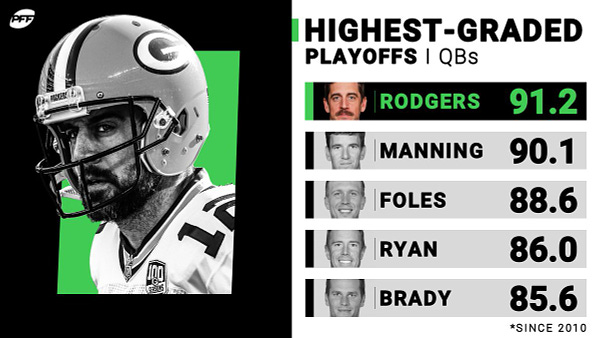

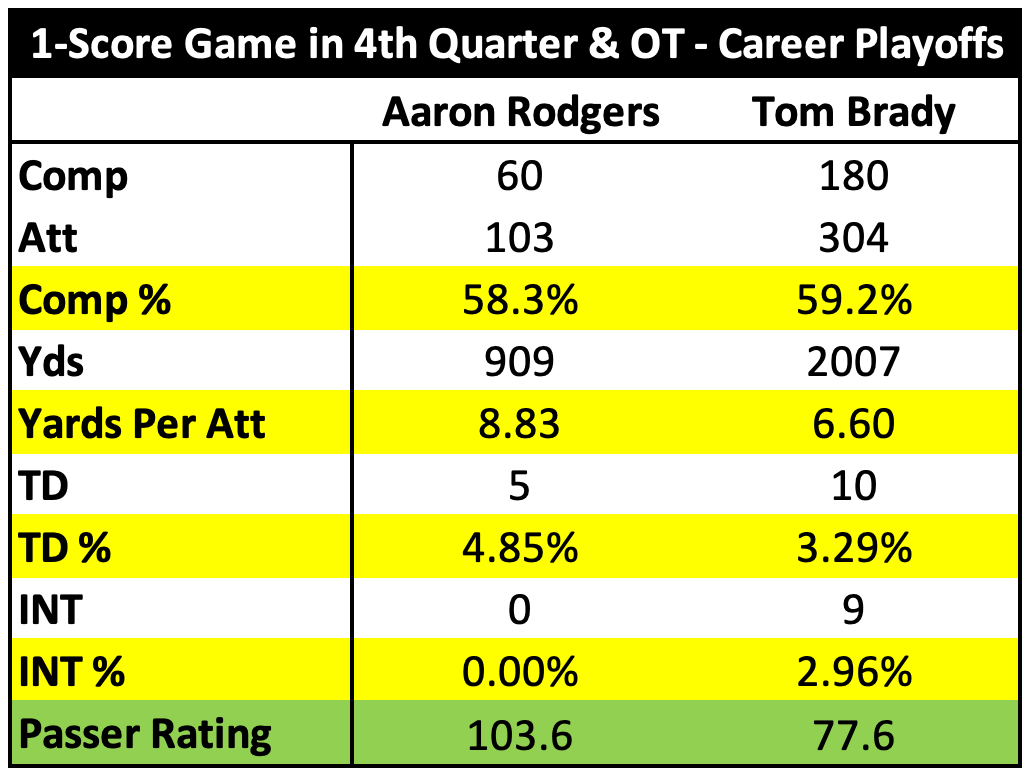
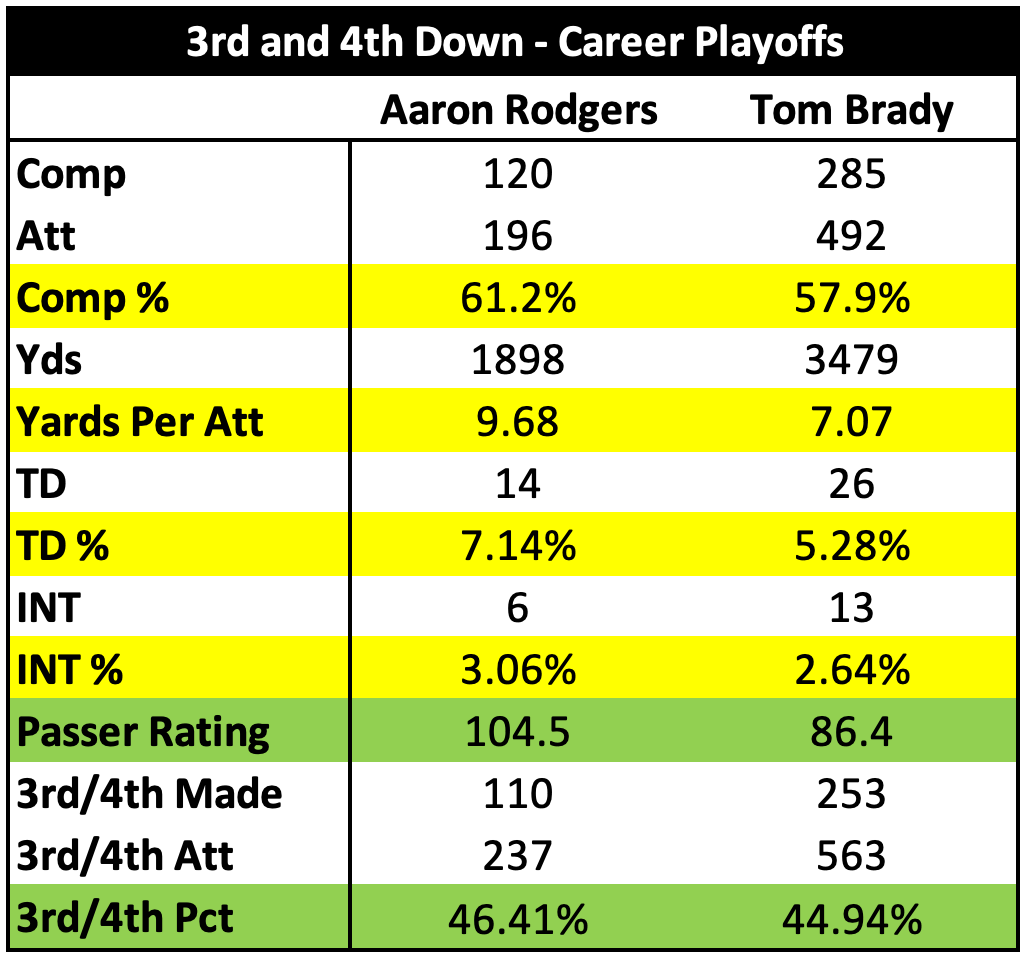
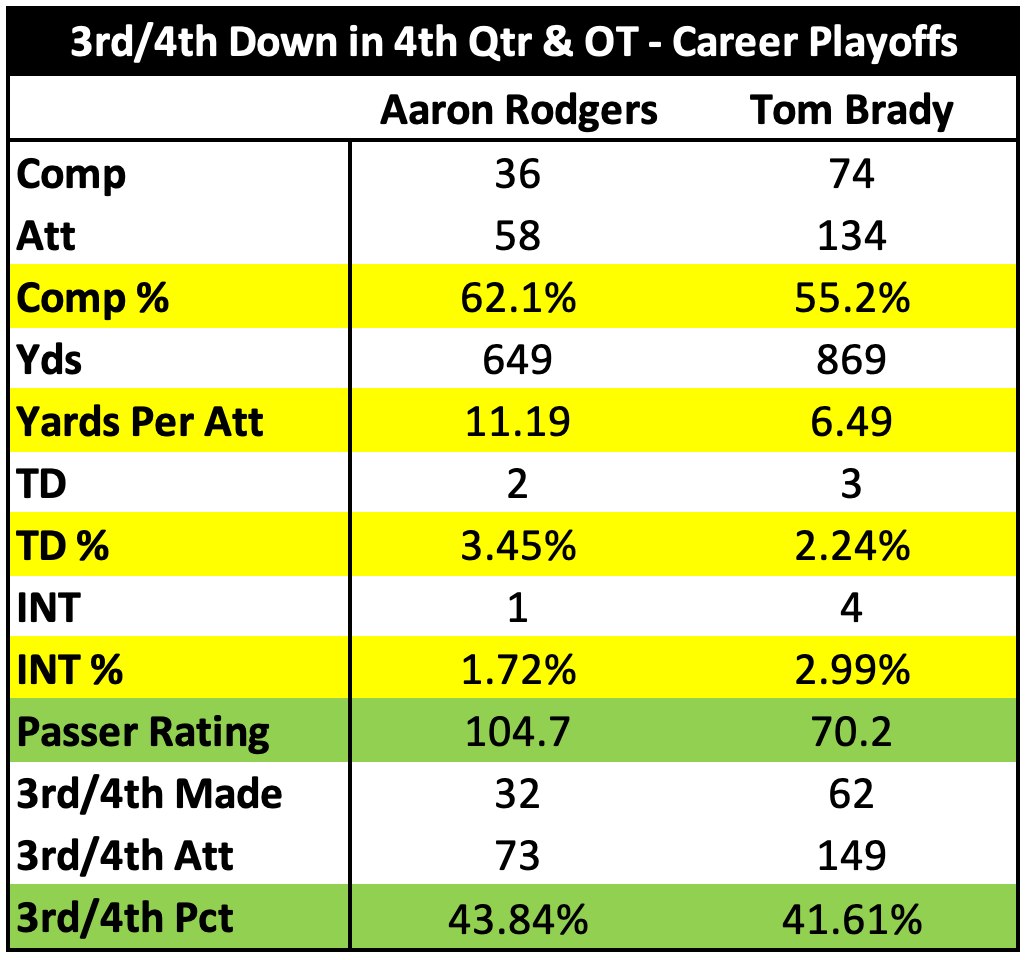
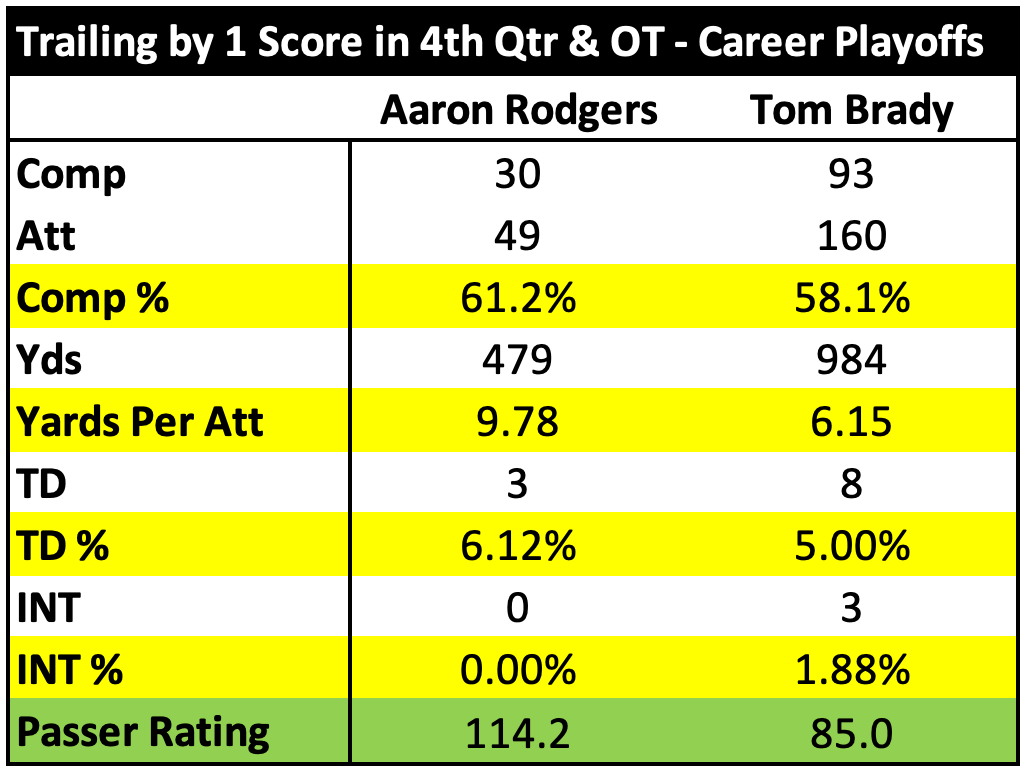
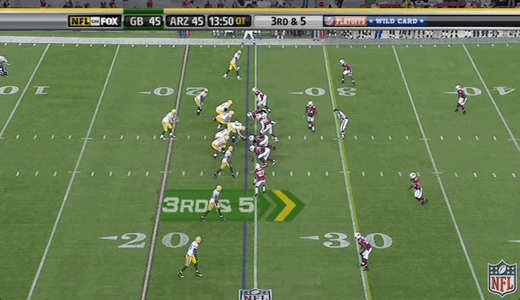

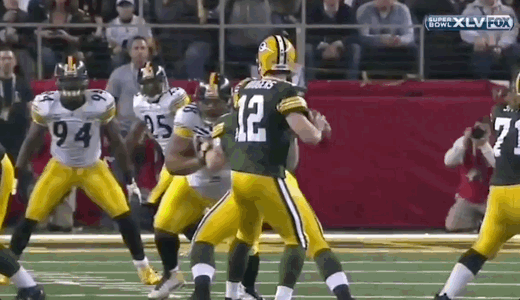
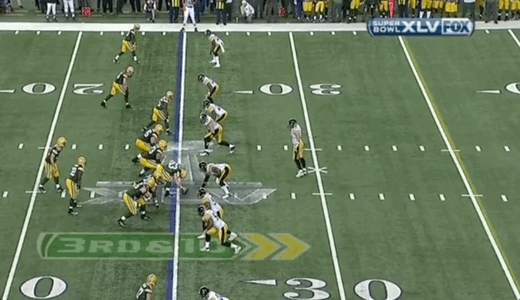
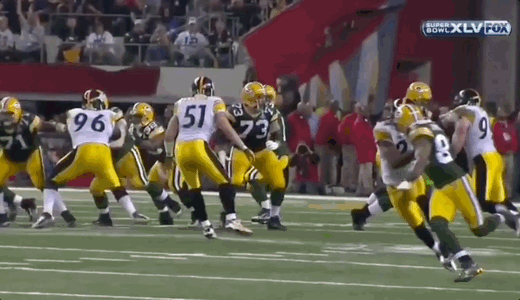
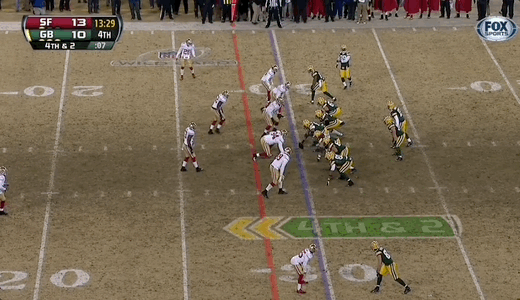
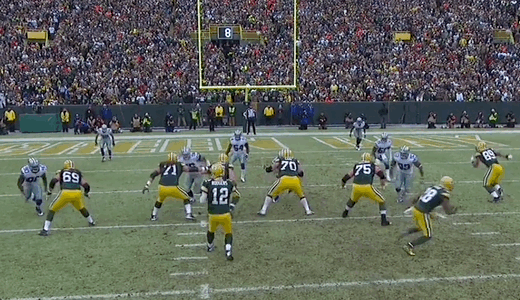
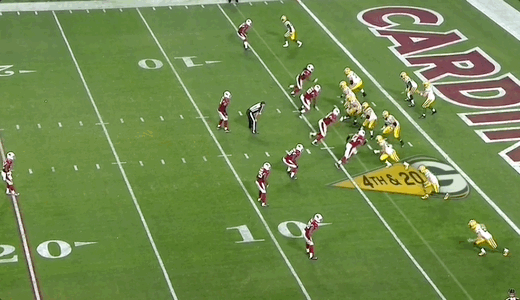
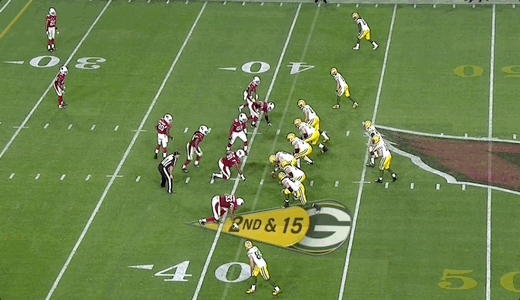
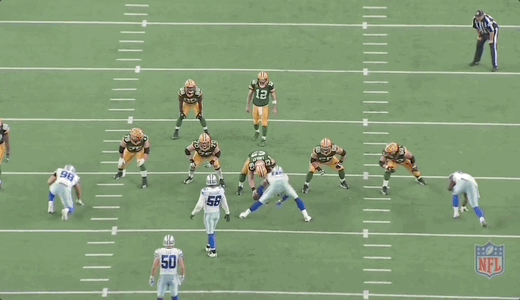

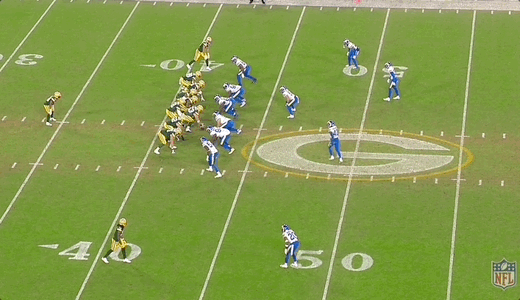
You can literally feel the outcome bias.
People who credit Tom Brady for being a winner tend to forget that he played with the best D/ST of a generation in the original dynasty, allowing him to win the 2001 Super Bowl while scoring just 29 (!) offensive points in an entire postseason (16 vs Oakland, 0 against Pittsburgh, 13 against St Louis), and in general make more mistakes than any other QB would've even been allowed the chance to come back from.
Even in a situation like the 2016 Super Bowl, the main catalyst for that comeback was a herculean performance from the Patriot defence to hold one of the best offences of all time (2016 Falcons) to just 21 offensive points. We saw what the Falcons did to the Packer defence. Instead of 28-3, the Falcon lead was 31-0 by the time the Packers scored their first touchdown. That defensive performance is why Tom was able to come back scoring three touchdowns out of five second half touches in the Super Bowl, and Aaron was laughed at and mocked scoring three touchdowns out of five second half touches, in back to back games against the same Falcon team.
Is that because Tom is a winner? No. It's because the Patriots are winners.
Aaron repeatedly runs into comparisons like this over his long and great playoff career (compare Aaron's performance against the 2013 49ers to Russell Wilson's, for example). It's just the wins that never came, except for the one magic run in 2010. People will yell 'excuse!' when I claim that this is bad luck and nothing more, but that's my opinion on what Aaron's playoff career was.